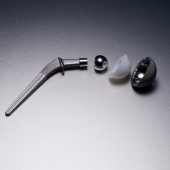
TUESDAY, April 3 (HealthDay News) —
People with metal-on-metal hip replacements do not have an increased risk of cancer during the first seven years after they receive the device, according to a new study.
However, a longer-term study should be done, researchers at the Universities of Bristol and Exeter in the U.K. report.
They examined data from the National Joint Registry of England and Wales, which contains records on more than 1 million hip replacement procedures. The researchers compared cancer rates in patients with metal-on-metal hip replacements, patients with hip replacements made with other materials, and the general population.
The chance of a 60-year-old man with moderate health and a metal-on-metal stemmed hip replacement being diagnosed with cancer in the five years after surgery was 6.2 percent, compared to 6.7 percent with a hip replacement made with other materials.
For women, the risk was 4 percent for a metal-on-metal stemmed hip replacement and 4.4 percent for a hip replacement made with other materials.
The researchers also found that the incidence of cancer is low after hip replacement and lower than that predicted for age- and sex-matched people in the general population.
The study was published online April 3 in the British Medical Journal.
It’s hoped that these findings will help doctors reassure patients that the “risk of cancer for hip replacement patients is relatively low,” the researchers wrote.
However, they added that long-term data on hip replacement patients needs to be collected over the next few decades as some cancers can take many years to develop.
Last month, British researchers said there was “unequivocal evidence” that stemmed metal-on-metal hip replacements fail at much higher rates than other types of hip implants and should be banned.
The failure rate is particularly high for stemmed metal-on-metal hip implants with larger head sizes and those implanted in women. In these cases, failure rates are up to four times higher than other types of hip implants, according to the study in The Lancet.
More information
The U.S. National Institute of Arthritis and Musculoskeletal and Skin Diseases has more about hip replacement.

